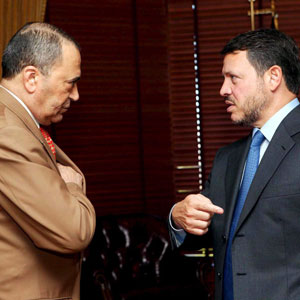
King Abdullah II (R) speaks with his newly-named Prime Minister, Maaruf Bakheet, 24 November 2005 in Amman (AFP)
AMMAN, (Reuters) – Jordan”s King Abdullah appointed his national security chief as prime minister on Thursday and urged him to adopt a tough stance against Islamic militancy but ensure political liberalisation was not jeopardised.
Abdullah asked Marouf Bakheet, 58, a former ambassador to Israel with a long career in military intelligence, to form a new government to address security concerns after triple suicide bombings killed 60 people, officials said.
"We have to speed up adopting a law that counters terror in all its forms … and fight an all-out war on schools of thought that thrive on bigotry, extremism and feed on the ignorance of simple and naive people," the king said in a designation letter.
Former Prime Minister Adnan Badran, 69, a U.S.-educated academic appointed last April, and his government resigned after he was criticised for pushing a pro-Western reform agenda while ignoring tribal sensitivities.
Although the changes had long been expected, security concerns have become a priority after the Nov. 9 bombings at three luxury hotels, for which the Al Qaeda wing in Iraq headed by Jordanian Abu Musab al-Zarqawi has claimed responsibility.
Bakheet”s appointment also signals Abdullah wants to give more influence to old-guard military figures with a reputation for integrity and untainted by corruption, senior officials say.
Officials say Abdullah will count on Bakheet to win support for his economic and political reforms among the conservative establishment, backbone of the king”s power base, which fears accelerated reforms could erode of its grip on power.
"(Bakheet) will balance security concerns with the need to push forward His Majesty”s reform agenda to move the country toward greater political liberties," said one senior official.
Bakheet is expected to form his government in the next few days.
The government change was part of a wider reshuffle that had been planned for months, including a shake-up of the royal court to bring in new advisers and the appointment of a new upper house with seasoned politicians to redress an imbalance against tribal politicians.
Abdullah surprised many when he appointed Badran to succeed Faisal al-Fayez, blamed by politicians for several policy blunders, including mismanagement of government finances.
Tough parliamentary criticism of Badran”s performance has been viewed as the most direct challenge to Abdullah since he took the throne in 1999.
A few months ago Badran had to succumb to tribal pressure and accept the resignation of Bassem Awadallah, the king”s favourite moderniser, and the driving force behind accelerated reforms.
Political insiders say the king had been frustrated with conservative politicians with extensive powers who had tried to put the brakes on democratic reforms. The conservatives fear the reforms could dilute the influence of their Bedouin power base.
They also fear Abdullah would promote changes in the electoral law that reformers say could give Palestinians bigger representation in parliament, now dominated by tribal politicians long seen as the backbone of the king”s support.
Most powers rest with the king, who appoints governments, approves legislation and can dissolve parliament.

An undated picture released by the Jordanian official news agency PETRA shows newly appointed Prime Minister Maaruf Bakheet, 58, in Amman (AFP)

Jordan’s King Abdullah II attends the launch of the Royal Village in Amman 24 November 2005 (AFP)
